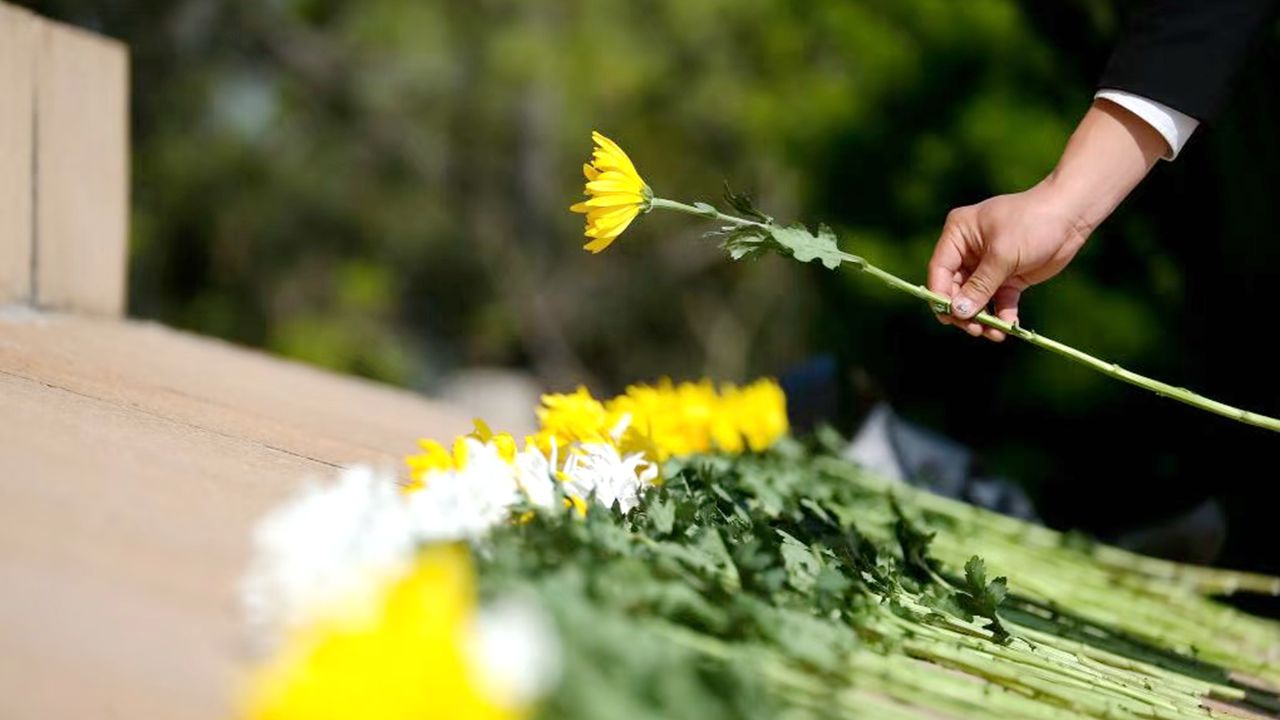A tomb sweeping day in Tengchong
Writer: Oyang Ziyi | Editor: Zhang Zhiqing | From: Original | Updated: 2025-05-20
On Tomb Sweeping Day of 2025, as the world marked the 80th anniversary of the victory in World War against Fascism, I traveled to Tengchong, moved by a deep sense of duty to honor my ancestors and pay tribute to the heroes of the past.
I joined the procession at the foot of the mountain. Dressed in black, each of us held white and yellow chrysanthemums. At the front, plain white bannersbearing black patterns and characters were softened by a fine drizzle, while bright wreaths swayed gently in the wind. Along the path, low mounds of graves dotted the landscape, tombstones standing solemnly amid the misty rain.

A person pays tribute to martyrs at a martyrs' cemetery in Jurong, Jiangsu Province on April 3, 2025. People across the country attended various activities to pay tribute to martyrs ahead of the Qingming Festival, which falls on April 4 this year. Zhong Xueman/Xinhua
As we silently ascended the mountain, a light rain accompanied uson the road to the martyrs' cemetery. The sparse wild grass in front of the graves was damp with raindrops, each bead shimmering like a tear.
When the dark gray monument of the Expeditionary Force came into view, I looked up and gazed at it. The weathered patterns etched into the stone seemed to be gazing back at me. I was looking at history, and history was looking back at me.
I climbed the short flight of steps in front of the tombstones. Though it took me only half a minute, the martyrs had spent half their lives on this journey. I bowed deeply three times to the grand monument and read my declaration of youth. I bowed solemnly to the monument and solemnly read my declaration of youthas a representative of the younger generation. My voice carried reverence and a steadfast resolve to carry on their legacy.
I chose to come to Tengchong for three reasons. First, to follow the footsteps of my ancestor Ouyang Yuan. In 1943, after being admitted to the Southwest Associated University, Ouyang Yuan took up arms and wrote in his "Declaration of Enlistment": "I fear not death. I face it as if returning home." His words embody the spirit of thousands of soldiers, who, in the face of national peril, rose with righteousness and loyalty, forever inscribing the spirit of Chinese youth into the pages of history.
Moreover, as someone from Hunan, my visit to Tengchong holds special significance--- it is a tribute to the fallen heroes from Hunan. In those days, countless young men from Hunan left the banks of the Xiang River and rushed to the Nu River battlefield, carrying the spirit of "enduring hardship and being unyielding."
Simple equipment and harsh conditions could not dim the fiery light in their eyes. Though fear stirred in their hearts amid the roar of artillery, they knew that behind them stood millions of people and the vast mountains and rivers of the motherland.
It was these Hunanese youths, fighting side by side with passionate young people from across the country, who built a Great Wall of flesh and blood, forging the legend that "as long as Hunan survives, China will survive." Their sacrifice became an immortal legacy in the victory of the war of resistance against Japan.
But above all, I come to Tengchong because I am Chinese. In the Martyrs' Cemetery, rows of tombstones stand quietly, telling stories of the past. Over eighty years ago, countless heroes fought fiercely with the invaders on the soil of Western Yunnan, proving with their lives that the backbone of the Chinese people will never be bent.
The spirit of the War of Resistance Against Japanese Aggression has long been woven into the spiritual fabric of every Chinese. History is our greatest teacher and also our most sobering warning. As youth of the new era, we must remember this painful history and ensure that honoring the martyrs is not merely a ritual, but a responsibility that flows through our very blood.
Standing beneath the towering monument to the heroes, I know that mere words cannot bear the weight of this history. Pale words cannot carry the gravity of that past. Those buried here are the most ordinary yet the greatest of young people, who gave everything for their ideals and their homeland. All I can do is to offer a bouquet of white chrysanthemums, hoping that this pure white can wash away the dust of their journey, and that the brilliant sunshine will forever shine upon the mountains and rivers they once protected with their lives.
(The writer is a student at Shenzhen Middle School)